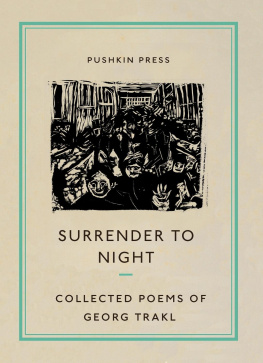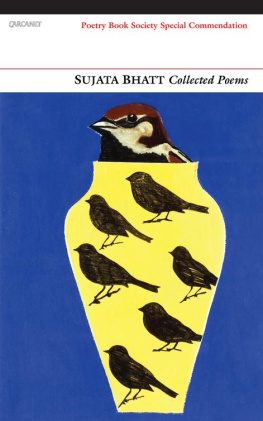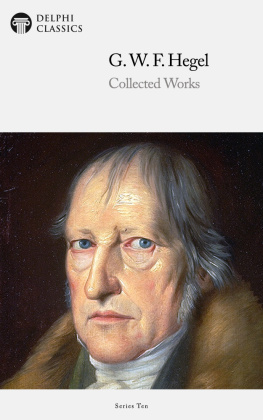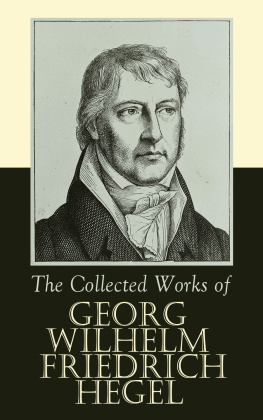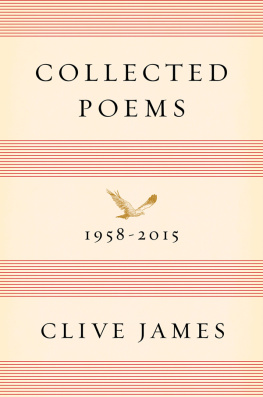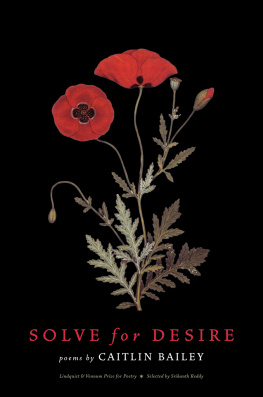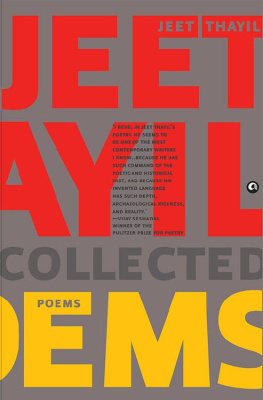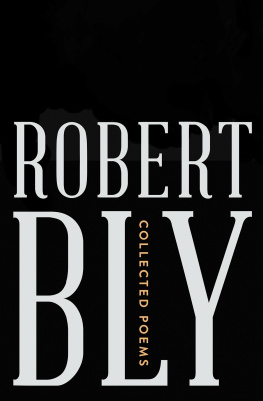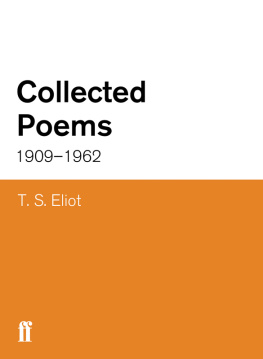Stone Will - Surrender to night: collected poems of Georg Trakl
Here you can read online Stone Will - Surrender to night: collected poems of Georg Trakl full text of the book (entire story) in english for free. Download pdf and epub, get meaning, cover and reviews about this ebook. City: La Vergne, year: 2019, publisher: Pushkin Press, genre: Detective and thriller. Description of the work, (preface) as well as reviews are available. Best literature library LitArk.com created for fans of good reading and offers a wide selection of genres:
Romance novel
Science fiction
Adventure
Detective
Science
History
Home and family
Prose
Art
Politics
Computer
Non-fiction
Religion
Business
Children
Humor
Choose a favorite category and find really read worthwhile books. Enjoy immersion in the world of imagination, feel the emotions of the characters or learn something new for yourself, make an fascinating discovery.
- Book:Surrender to night: collected poems of Georg Trakl
- Author:
- Publisher:Pushkin Press
- Genre:
- Year:2019
- City:La Vergne
- Rating:5 / 5
- Favourites:Add to favourites
- Your mark:
- 100
- 1
- 2
- 3
- 4
- 5
Surrender to night: collected poems of Georg Trakl: summary, description and annotation
We offer to read an annotation, description, summary or preface (depends on what the author of the book "Surrender to night: collected poems of Georg Trakl" wrote himself). If you haven't found the necessary information about the book — write in the comments, we will try to find it.
Stone Will: author's other books
Who wrote Surrender to night: collected poems of Georg Trakl? Find out the surname, the name of the author of the book and a list of all author's works by series.
Surrender to night: collected poems of Georg Trakl — read online for free the complete book (whole text) full work
Below is the text of the book, divided by pages. System saving the place of the last page read, allows you to conveniently read the book "Surrender to night: collected poems of Georg Trakl" online for free, without having to search again every time where you left off. Put a bookmark, and you can go to the page where you finished reading at any time.
Font size:
Interval:
Bookmark:
This book is dedicated to the memory of Anthony Vivis (19432013) Translator of German literature, co-translator and friend
The unclassifiable, morbidly introspective poetry which mesmerizes new generations of readers was the sole fruit of his troubled existence and confirms his status as one of the key German-language poets of the twentieth century. Trakls poetic legacy was forged over five dynamic years for European culture, 190914, before the poet vanished in cruel circumstances in the opening months of the First World War. Trakls life was principally spent in Austrian towns and cities, first in the sanctuary of the romantic Baroque surroundings of Salzburg, then later in the, for him, more alienating metropolis of Vienna and in the home city of his publisher, Innsbruck. Apart from a trip to Venice in the summer of 1914, Trakl spent most of his short life in these three locations. Following the poets ordeals on the Eastern Front in Galicia, a final tragic denouement took place in the Polish city of Krakw. Georg Trakl was born on 3rd February 1887, the fifth of seven children, in the Schaffner House (now the Trakl-Haus museum) on Waagplatz 1a in Salzburg.
His Hungarian father and Slavic mother had immigrated in 1879 from Wiener Neustadt and in 1893 his father, Tobias, opened a hardware store on nearby Mozartplatz, to which the family moved, taking spacious apartments on the first floor. Some of Trakls early poems concern subjects he saw from the windows of these bright-lit rooms, namely the Mozart statue in the square and the surrounding mountains of the Gaisberg, the Kapuzinerberg and the Mnchsberg. The building is now a caf, offering a view largely unchanged since Trakls time, and its outer wall bears a discreet commemorative plaque. Here the Trakl children, virtually abandoned by their mother, were taught by a Catholic governess from Alsace who introduced them to French, the required language of the European cultural elite. Trakls early life was one of the outward security of a middle-class milieu, with piano lessons, visits to the theatre, happy hours spent in the rustic summer house of a nearby idyllic gardena traditional bourgeois upbringing which the Trakl parents, despite their immigrant roots, were keen to espouse for those belonging to the Bildungsbrgertum. Period photographs show the ubiquitously sailor-suited and lace-adorned infants obediently lined up in age and height for formal portraits.
But the mother, Maria Catharina, was self-absorbed and distant, more concerned with her bibelots and antiques than with her children, and she was also a little too keen on opium, a vice that would later contribute to her sons ruin. It was the governess, then, who shaped the childrens adolescence and it was she who introduced young Georg to French-language poetry: the requisite Baudelaire, Verlaine, Rimbaud, but also, importantly, the strange, dreamlike poetry of the Belgian poet and dramatist Maurice Maeterlinck. In childhood Trakl became particularly close to one sister, Margarethe or Grete. The nature of this infamous, arguably incestuous, relationship, whose parameters have never been fully confirmed and perhaps should not be, proved a defining existential moment for the acutely sensitive boy, and later left him wracked by guilt at the desire he felt for his sibling and what had taken place between them in childhood. Though apart much of the time in adulthood, their spirits remained closely interwoven throughout their lives, both destined for struggle and unhappiness, victims of depressive illness and suicidal impulses. Trakl was a conventional student and there was little to mark him out.
He began to read Nietzsche and Schopenhauer, required reading along with the Symbolist poets, and his own early poems he read aloud to his classmates. He impulsively left school early to train as a pharmacist, his assumption being that he could more easily gain access to the narcotics with which he was already locked in a fatal embrace, completing three years of on-the-job training at the Apotheke Zum weissen Engel (the White Angel) at Linzergasse 5 in Salzburg between 1905 and 1908. In these years Trakl was part of a literary group called Apollo, which was later renamed Minerva. A telling photograph from 1906 shows the earnest young dilettantes posed awkwardly around an ornate antique table positioned on a lawn before a house romantically overgrown with ivy. Encouraged by Gustav Streicher, a local playwright, Trakl wrote two dramatic texts, Totentag and Fata Morgana, which were shown at the prestigious city theatre. But they proved a critical failure and Trakl ceremonially destroyed his notebooks and reverted to poetry.
Trakls position in the pharmacy facilitated his access to veronal, opium and later cocaine. He grew increasingly dependent on a range of drugs to cope with what the poet Rainer Maria Rilke would later term the unbearable weight of his own existence. Trakls lifestyle became more anti-bourgeois and erratic, and by now he was an avid reader of the magazine Die Fackel (The Torch), edited by Karl Kraus, which regularly lambasted Austrian politics and institutions. Trakl eschewed crowds, preferring solitude, long walks and lonely vigils in country taverns. His early poems are saturated with memory images of this wandering country life in the landscape around his home city, visions of the drunken man returning from the tavern through the dusking wood. Trakl found solace roaming the wooded hills of the mountains, or lingering in the romantic environs of the castle of Anif, or the palace and gardens at Hellbrunn.
In 1908 Trakl abruptly left the provincial life and his minor post at Apotheke Zum weissen Engel, moving to Vienna to study pharmacy. Faced with the alienating effects of the metropolis, Trakls innate sense of anxiety and despair at mankinds spiritual decline was heightened by what he experienced and observed in the capital. In Europe this was an era of burgeoning materialism and technological change, progress appeared prescribed, unstoppable, but nationalism was emboldened, there were ugly stirrings around social Darwinism, dark tributaries leading into the eventual rapids of revolution and totalitarianism, the final paroxysm Trakl painfully anticipates. The poets alienation from the decadent city multitude now crucially fused with the earlier formative atmosphere of rural solitariness, of being the outsider apart from the normal country folk, of being in some sense damned, a lonely one, in the company of madmen, beggars and prostitutes, the fallen with whom he felt a bond. Trakls distinctive poetic language seems to evolve, to gather momentum out of this difficult Vienna period. Trakls close school friend Erhard Buschbeck also moved to Vienna at this time, and through Buschbecks social circle Trakl became acquainted with figures from the Wiener Moderne such as Adolf Loos, Arnold Schnberg und Oskar Kokoschka.
Font size:
Interval:
Bookmark:
Similar books «Surrender to night: collected poems of Georg Trakl»
Look at similar books to Surrender to night: collected poems of Georg Trakl. We have selected literature similar in name and meaning in the hope of providing readers with more options to find new, interesting, not yet read works.
Discussion, reviews of the book Surrender to night: collected poems of Georg Trakl and just readers' own opinions. Leave your comments, write what you think about the work, its meaning or the main characters. Specify what exactly you liked and what you didn't like, and why you think so.

